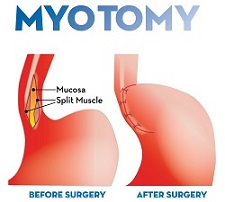Motility Disorders
Your esophagus is a tube that carries food from your mouth to your stomach. Normally, your esophagus moves your food with a wave of contractions, or peristalsis. Motility disorders of the esophagus occur when the peristalsis does not work as it should. This can impair your body’s ability to pass your food easily to your stomach. The thoracic experts at St. Elizabeth Healthcare understand the impact this can have on your life and we want to help you with the diagnosis and any treatment you might need.
Motility disorders of the esophagus include:
- Achalasia
- Diffuse esophageal spasm
- Nutcracker esophagus
- Hypertensive lower esophageal sphincter
Symptoms of Motility Disorders
The symptoms of motility disorders can vary according to which disorder you have. Many may include:
- Dysphagia or difficulty swallowing
- Chest pain
- Heartburn
- Regurgitation

Learn More
For more information or to schedule an appointment with the St. Elizabeth Thoracic Surgery office, please call
(859) 301-2465.
Causes of Motility Disorders
The cause of many esophageal motility disorders is unknown.
Diagnosing Motility Disorders
Diagnosing motility disorders requires expertise and careful consideration of your unique symptoms and situation. Our thoracic experts will begin with a thorough examination and may order further tests.
Tests that may be ordered to help in your diagnosis include:
- Upper GI endoscopy uses an endoscope to see inside your upper GI tract to determine if you have any changes in its lining.
- Barium swallow uses barium to monitor movement through your esophagus, stomach and small intestine.
- Esophageal manometry a gold standard test to diagnose the motility of the esophagus.
- Acid reflux tests
Treating Motility Disorders
There is no known cure for esophageal motility disease. Treatment focuses on managing symptoms and keeping the disorder from progressing further.
Treatment may include:
- Medications like calcium channel blockers or nitroglycerin to help relax smooth muscles.
- Botox injected into the esophageal valve.
- Balloon dilation to stretch the muscles in your lower esophageal valve.
- Long esophageal myotomy – surgical procedure which opens your esophageal muscle along its body.
- Laparoscopic Heller myotomy, minimally invasive surgical option to open up your esophageal valve.
Schedule an Appointment Today
Call Us to Schedule a Visit
For more information or to schedule an appointment with the St. Elizabeth Thoracic Surgery office, please call
(859) 301-2465.


